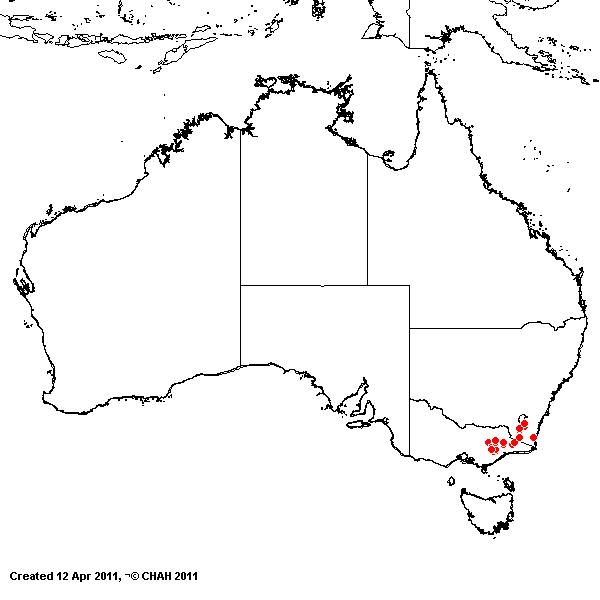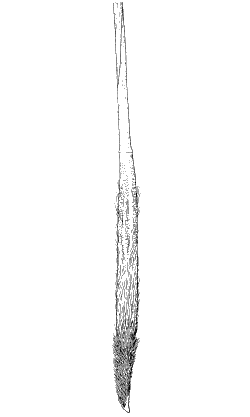Austrostipa nivicola (J.H.Willis)
S.W.L.Jacobs & J.Everett. Telopea 6: 587 (1996).
Classification. (GPWG 2001) : Subfamily Pooideae. Tribe Stipeae.
Basionym and/or
Replacement Name: Stipa nivicola J.
H. Willis, Victoria Naturalist 73: 149 (1957).
Type of Basionym or
Protologue Information: HT: J.H. Willis s.n., 2 Feb 1949, Australia:
Victoria: Bogong High Plains, 1650 m, grassy slopes of Middle Creek, near Rover
Scout Hut, 2 Feb 1949 (MEL; IT: NSW-116164).
Key references
(books and floras): [2002] D.Sharp & B.K.Simon, AusGrass, Grasses of
Australia, [2008] S.W.L.Jacobs, R.D.B.Walley & D.J.B.Wheeler, Grasses
of New South Wales (155), [2009] A.Wilson (ed.). Flora of Australia,
Vol 44A. Poaceae 2 (40).
Illustrations:
[2008] S.W.L.Jacobs, R.D.B.Whalley & D.J.B.Wheeler, Grasses of New South
Wales, 4th edn (155), [2009]. A.Wilson (ed.), Flora of Australia 44A:
Poaceae 2 (55, Fig 8).
Habit.
Perennial. Rhizomes present, short. Culms erect or geniculately ascending,
25–50 cm tall, 1 mm diam., firm, 2–3 -noded. Mid-culm internodes pubescent.
Mid-culm nodes glabrous or pubescent. Lateral branches simple. Leaves mostly
basal. Leaf-sheaths glabrous on surface. Ligule a fringed membrane, a ciliolate
membrane, 0.4–1.5 mm long, truncate. Leaf-blades involute or convolute, 10–20
cm long, 1.5–3.5 mm wide. Leaf-blade surface scaberulous.
Inflorescence.
Inflorescence compound, a panicle. Panicle linear, 5–20 cm long, 1–2.5 cm wide.
Spikelets.
Spikelets pedicelled. Fertile spikelets 1-flowered, comprising 1 fertile
floret(s), without rachilla extension, linear, terete, 20–25 mm long.
Glumes. Glumes
similar, thinner than fertile lemma. Lower glume lanceolate, membranous,
without keels, 4 -nerved. Lower glume surface indumented. Upper glume
lanceolate, 15–20 mm long, membranous, without keels, 5 -nerved.
Florets.
Fertile lemma 12–15 mm long, without keel, 5 -nerved. Lemma surface indumented.
Lemma apex entire, awned, 1 -awned. Median (principal) awn 85–130 mm long
overall, with a twisted column. Column 45–70 mm long. Palea 2 -nerved, without
keels. Lodicules present. Anthers 3. Grain 6–7.5 mm long.
Continental
Distribution: Australasia.
Australian
Distribution: New South Wales, Victoria.
New South Wales:
Southern Tablelands. Victoria: Snowfields.
Notes. Southern New South
Wales and northern Victoria on the Australian Alps and Bimberi Range.



